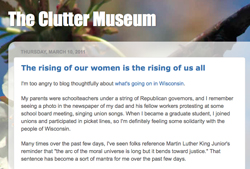Today, a friend and colleague asked me if I was energized for the fall semester.
“Nope!” I texted to her.
I meant for it to be funny, but in the context of the conversation we were having, my response came across as angry and sad.
Why was I sad? I enjoy teaching. I like students. It’s always nice to catch up with my colleagues when they return to their History department offices. The week before school—that’s next week—involves a lot of prep, yes, but also a lot of good conversation and über-pleasant collegiality.
I paused a moment to probe the source of my sadness and anger. Was I experiencing the first twinge of a depressive turn, a chemical low combined with feelings of overwhelm?
No.
. . .
Since the beginning of last academic year, I have interviewed for four different staff jobs at three different colleges and universities, making it through several rounds at each campus. Two of those campuses still have not hired anyone for the positions for which I’ve interviewed; I’m uncertain about whether someone was hired for the third; and the final job was offered to me last Friday. Each of the positions was in different fields–research and social media; proposal writing; directing an events center/intellectual hub at one of the nation’s top liberal arts colleges; and an academic specialist within a student affairs department.
I couldn’t accept the student affairs job because it didn’t pay enough to live on–it was questionable it would cover the rent in its California town–and the university hadn’t provided the department with any leeway in negotiating the salary.
I would have loved to live in that town. I know lots of people in and around the place.
Undoubtedly this missed opportunity is making me less enthusiastic to return to the classroom. But that regret is not the biggest factor.
Nope.
. . .
I realized my lack of enthusiasm can be chalked up to the prospect of guns in the college classroom. Earlier this year, the Idaho legislature passed a law allowing anyone with certain permits or law enforcement experience to carry concealed weapons pretty much anywhere on campus. (Excluded: venues of 1,000 or more people.)
Have there been concealed weapons in my classroom before this semester? I can’t know for certain, but in 15 years of teaching, four of those in Idaho, I’m guessing that yes, a student brought a weapon to one of my classes.
But never have I taught in a context where the state openly welcomed guns in the classroom, where legislators encouraged students to arm themselves.
. . .
If I were a better historian and less emotionally exhausted, I might provide a brief history of how guns have been used again and again to subjugate already marginalized individuals and communities. I need not remind my readers of this: Gun violence and the threat of gun violence are all over the news this week, here and abroad, in Iraq, Syria, and Gaza. Gun rights activists in the U.S. like to speak of tyrants who are coming for their guns, but let’s be clear–the ones talking about bringing guns into the context of everyday life are the most dangerous. Those who suggest guns have a place in the college classroom are tyrannical, for the presence of gun—or the suggestion or possibility of its presence—renders exceptionally difficult the free and open exchange of ideas.
Last spring, when my colleagues and I stood on Boise State’s central campus raising students’ awareness about the guns-on-campus bill, I spoke with several students who couldn’t wait to bring guns into the classroom and in fact admitted they had already concealed weapons in Boise State’s classrooms. These young white men envisioned themselves as potential vigilante heroes in an “active shooter” situation they believe is inevitable in any “gun-free zone.”
. . .
The reality is this: there are going to be guns in my classroom, and there’s nothing I can do about it. This reality will change my relationship with students. It will diminish teaching and learning.
And by standing up in front of the class and not saying anything about it (because I can only imagine the hellfire that would rain down on me if a student complained to the campus lawyers or the media); by drawing a paycheck from the state; by submitting my tenure binders in the next month; by continuing to show up and pretend (as a historian!) that guns, and especially guns owned and carried by conservative white men, haven’t been an instrument of oppression and torture in this country; as if Idaho doesn’t have one of the highest rates of homicide by gun in domestic violence cases and one of the highest rates of suicide by gun; as if our very few black students aren’t placed at a dangerous, life-threatening disadvantage under this policy—I am complicit.
Am I submitting a letter of resignation?
Nope.
To be blunt, I can’t afford to do so. We’ve exhausted our savings, and non-minimum-wage jobs are few and far between here. I have to keep my job until I find another one.
. . .
Still, I am complicit. And it’s profoundly troubling.
I went looking for a wisdom in the Quaker nonviolence testimonies, hoping one would capture what I’m feeling and provide me with some comfort or inspiration. I came across this passage by John Lampen, published in Catherine Whitmire’s collection Plain Living: A Quaker Path to Simplicity.
When we are confronted with hurt to ourselves or others, and the rational ways of mending it are not effective, we are forced to choose between complicity in the universal wrong and an act of sacrifice. Then the divine voice inside us insists that this is the most important choice of all. . . .
The journey, the renunciation, the heroism, may be called for within our own hearts, a private matter between us and God. It happens when we accept the hurt, and do not let it enslave or degrade us, but endure it, and refuse to pass it on. When we choose this path, we cannot foresee its end; we can’t say it if will do any good. It is a starting point, not a solution. We don’t know what will be asked of us next. But by this sacrifice we have identified ourselves with whatever power there is in the universe to redeem and recreate.
. . .
I can’t make the big sacrifice that needs to be made in this situation. I can’t walk away until I have a job offer sufficient to support my family.
My options thus are reduced to small resistances, to letting my life speak rather than my lectures.
What forms might such resistance take for this assistant professor? Leave your ideas in the comments.


Is you husband also looking? Would he be able to find employment in places like that CA town?
I totally sympathize.
When I was in grad school, I was walking on the mall behind two young white men, and they were chatting about having brought guns to class. It was terrifying. But it wasn’t (at that time) encouraged by the state.
And like lots of other folks, I wonder at how white men want to be able to carry guns openly, and yet black men get shot when unarmed. I hate our gun culture. (And no, I don’t mean the culture of people who target shoot, or hunt respectfully.)
Unfortunately, I have no suggestions, but wanted to offer sympathy for your situation. When the Texas legislature was considering similar legislation, the chair of my department said if it passed, she would ask students who had guns with them to reveal that to her. I said that I didn’t think we could do that as their privacy would be protected. And she said something that profoundly struck me…she asked when did we get to point that the rights of people to carry guns supercedes the rights of others to go to work (in a college classroom, no less) in a place free of guns and the increased risk of gun violence? Such a poignant question that I do think deserves analysis.
Best wishes in the job search.